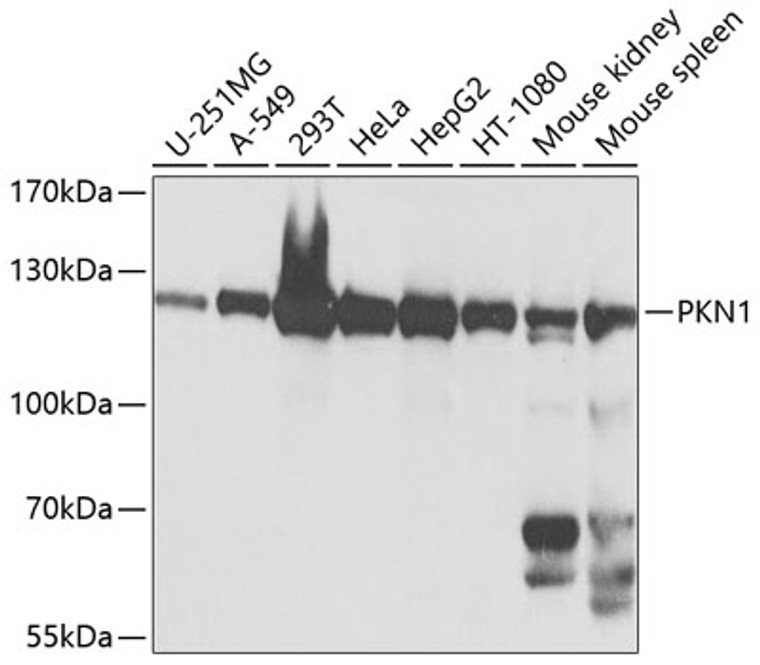| Host: |
Rabbit |
| Applications: |
WB/ELISA |
| Reactivity: |
Human/Mouse |
| Note: |
STRICTLY FOR FURTHER SCIENTIFIC RESEARCH USE ONLY (RUO). MUST NOT TO BE USED IN DIAGNOSTIC OR THERAPEUTIC APPLICATIONS. |
| Clonality: |
Polyclonal |
| Conjugation: |
Unconjugated |
| Isotype: |
IgG |
| Formulation: |
PBS with 0.02% Sodium Azide, 50% Glycerol, pH 7.3. |
| Purification: |
Affinity purification |
| Concentration: |
Lot specific |
| Dilution Range: |
WB:1:500-1:1000ELISA:Recommended starting concentration is 1 Mu g/mL. Please optimize the concentration based on your specific assay requirements. |
| Storage Instruction: |
Store at-20°C for up to 1 year from the date of receipt, and avoid repeat freeze-thaw cycles. |
| Gene Symbol: |
PKN1 |
| Gene ID: |
5585 |
| Uniprot ID: |
PKN1_HUMAN |
| Immunogen Region: |
1-300 |
| Specificity: |
Recombinant fusion protein containing a sequence corresponding to amino acids 1-300 of human PKN1 (NP_002732.3). |
| Immunogen Sequence: |
MASDAVQSEPRSWSLLEQLG LAGADLAAPGVQQQLELERE RLRREIRKELKLKEGAENLR RATTDLGRSLGPVELLLRGS SRRLDLLHQQLQELHAHVVL PDPAATHDGPQSPGAGGPTC SATNLSRVAGLEKQLAIELK VKQGAENMIQTYSNGSTKDR KLLLTAQQMLQDSKTKIDII RMQLRRALQAGQLENQAAPD DTQGSPDLGAVELRIEELRH HFRVEHAVAEGAKNVLRLL |
| Tissue Specificity | Found ubiquitously. Expressed in heart, brain, placenta, lung, skeletal muscle, kidney and pancreas. Expressed in numerous tumor cell lines, especially in breast tumor cells. |
| Post Translational Modifications | Autophosphorylated.preferably on serine. Phosphorylated during mitosis. Activated by limited proteolysis with trypsin. (Microbial infection) In case of infection, polyubiquitinated by the bacterial E3 ubiquitin-protein ligase SspH1, leading to its proteasomal degradation. |
| Function | PKC-related serine/threonine-protein kinase involved in various processes such as regulation of the intermediate filaments of the actin cytoskeleton, cell migration, tumor cell invasion and transcription regulation. Part of a signaling cascade that begins with the activation of the adrenergic receptor ADRA1B and leads to the activation of MAPK14. Regulates the cytoskeletal network by phosphorylating proteins such as VIM and neurofilament proteins NEFH, NEFL and NEFM, leading to inhibit their polymerization. Phosphorylates 'Ser-575', 'Ser-637' and 'Ser-669' of MAPT/Tau, lowering its ability to bind to microtubules, resulting in disruption of tubulin assembly. Acts as a key coactivator of androgen receptor (AR)-dependent transcription, by being recruited to AR target genes and specifically mediating phosphorylation of 'Thr-11' of histone H3 (H3T11ph), a specific tag for epigenetic transcriptional activation that promotes demethylation of histone H3 'Lys-9' (H3K9me) by KDM4C/JMJD2C. Phosphorylates HDAC5, HDAC7 and HDAC9, leading to impair their import in the nucleus. Phosphorylates 'Thr-38' of PPP1R14A, 'Ser-159', 'Ser-163' and 'Ser-170' of MARCKS, and GFAP. Able to phosphorylate RPS6 in vitro. |
| Protein Name | Serine/Threonine-Protein Kinase N1Protease-Activated Kinase 1Pak-1Protein Kinase C-Like 1Protein Kinase C-Like PknProtein Kinase Pkn-AlphaProtein-Kinase C-Related Kinase 1Serine-Threonine Protein Kinase N |
| Database Links | Reactome: R-HSA-5625740Reactome: R-HSA-5625886Reactome: R-HSA-8980692Reactome: R-HSA-9013026Reactome: R-HSA-9013106Reactome: R-HSA-9013149 |
| Cellular Localisation | CytoplasmNucleusEndosomeCell MembranePeripheral Membrane ProteinCleavage FurrowMidbodyAssociates With Chromatin In A Ligand-Dependent MannerLocalization To Endosomes Is Mediated Via Its Interaction With RhobAssociation To The Cell Membrane Is Dependent On Ser-377 PhosphorylationAccumulates During Telophase At The Cleavage Furrow And Finally Concentrates Around The Midbody In Cytokinesis |
| Alternative Antibody Names | Anti-Serine/Threonine-Protein Kinase N1 antibodyAnti-Protease-Activated Kinase 1 antibodyAnti-Pak-1 antibodyAnti-Protein Kinase C-Like 1 antibodyAnti-Protein Kinase C-Like Pkn antibodyAnti-Protein Kinase Pkn-Alpha antibodyAnti-Protein-Kinase C-Related Kinase 1 antibodyAnti-Serine-Threonine Protein Kinase N antibodyAnti-PKN1 antibodyAnti-PAK1 antibodyAnti-PKN antibodyAnti-PRK1 antibodyAnti-PRKCL1 antibody |
Information sourced from Uniprot.org
12 months for antibodies. 6 months for ELISA Kits. Please see website T&Cs for further guidance







